Address
304 North Cardinal St.
Dorchester Center, MA 02124
Work Hours
Monday to Friday: 7AM - 7PM
Weekend: 10AM - 5PM
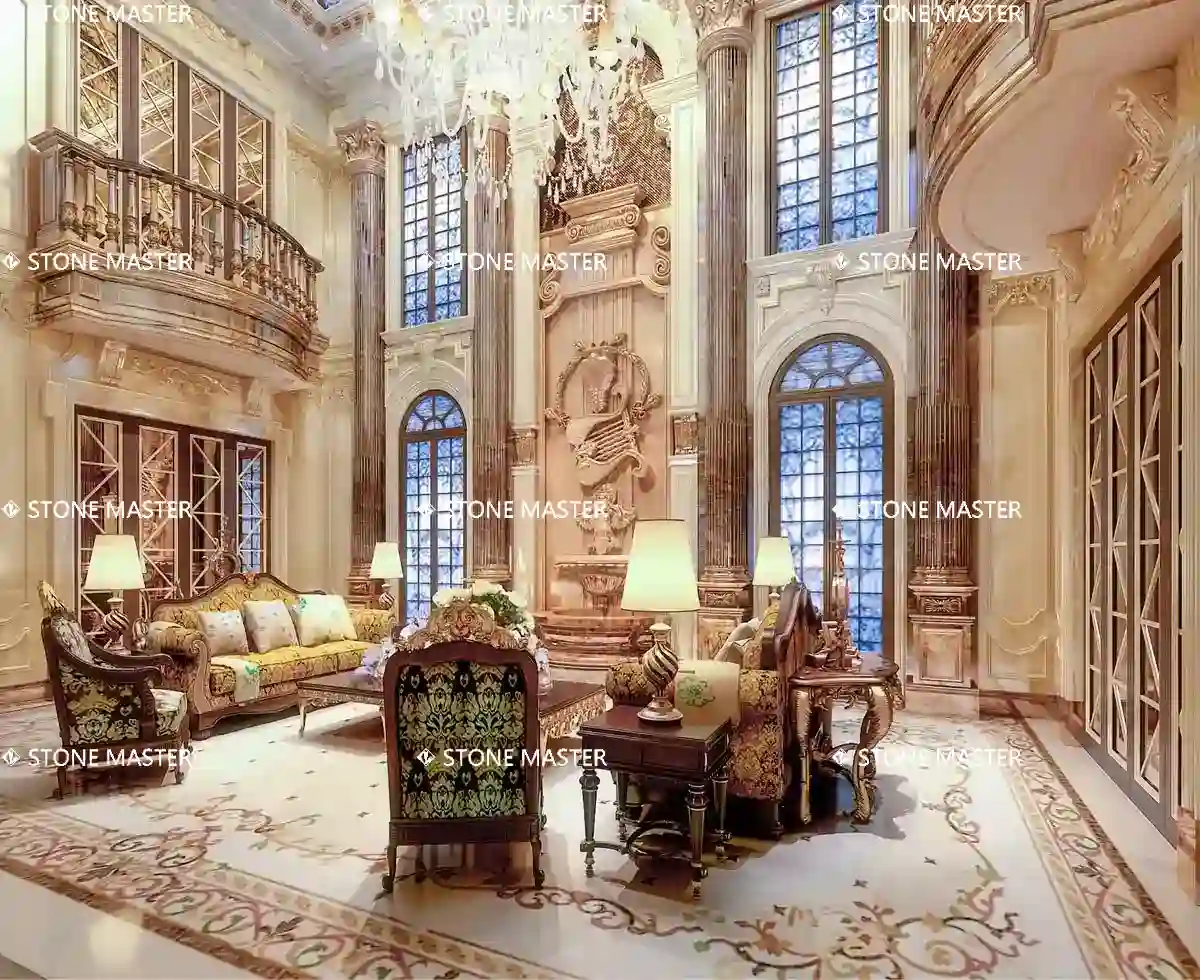
Marble inlay is a highly refined art form that involves embedding intricate patterns into a marble surface using cut pieces of colored stones.
This technique dates back centuries and was originally used in royal palaces, temples, and historic monuments.
Today, marble inlay continues to be a symbol of luxury and craftsmanship in modern interior design.
By combining natural stone with artistic design, marble inlay flooring offers a timeless aesthetic that few materials can match.
Whether it’s a grand entryway or a stylish bathroom, the elegance of marble inlay enhances any space.
The precision and detail of inlay in marble require skilled craftsmanship, making each piece a unique work of art.
If you’re wondering how this beautiful flooring is made or where it can be used, you’re in the right place.
Keep reading to explore the process, benefits, and design possibilities of marble inlay.
Marble inlay flooring is a decorative flooring technique that involves cutting small, shaped pieces of stone and embedding them into a marble surface.
Each element is precisely cut to fit together like a puzzle, forming detailed patterns or artwork directly into the floor.
This method, known as inlay in marble, requires exceptional craftsmanship and is often done by hand or with waterjet cutting machines.
The process begins with a design or motif, which is then transferred to the base slab of marble.
Artisans carefully carve out recesses and place each piece into the marble with precision and adhesive.
Once completed, the surface is polished flat, creating a seamless and smooth design.
Marble inlay work is more than decoration—it’s a functional art form that adds depth and texture to architectural spaces.
Unlike surface prints or basic tiles, an inlay marble floor is rich in dimension and artisan quality.
The visual impact of marble inlay flooring depends heavily on the materials chosen.
Designers and artisans use a wide variety of stones, including multicolored marble, to achieve contrast and vibrancy.
Gemstones like lapis lazuli, turquoise, mother of pearl, and malachite add richness and texture to the inlay designs.
Limestone, onyx, and quartzite are also commonly used for their distinct hues and translucency.
Each material offers unique characteristics—some bring bold color, others soft shimmer or natural veining.
The mix of textures and tones in a marble inlay floor creates visual depth and a luxurious atmosphere.
Because of this range, marble inlay flooring can suit a wide array of styles—from classical floral motifs to modern abstract patterns.
The combination of natural stones elevates every floor from functional to truly artistic.
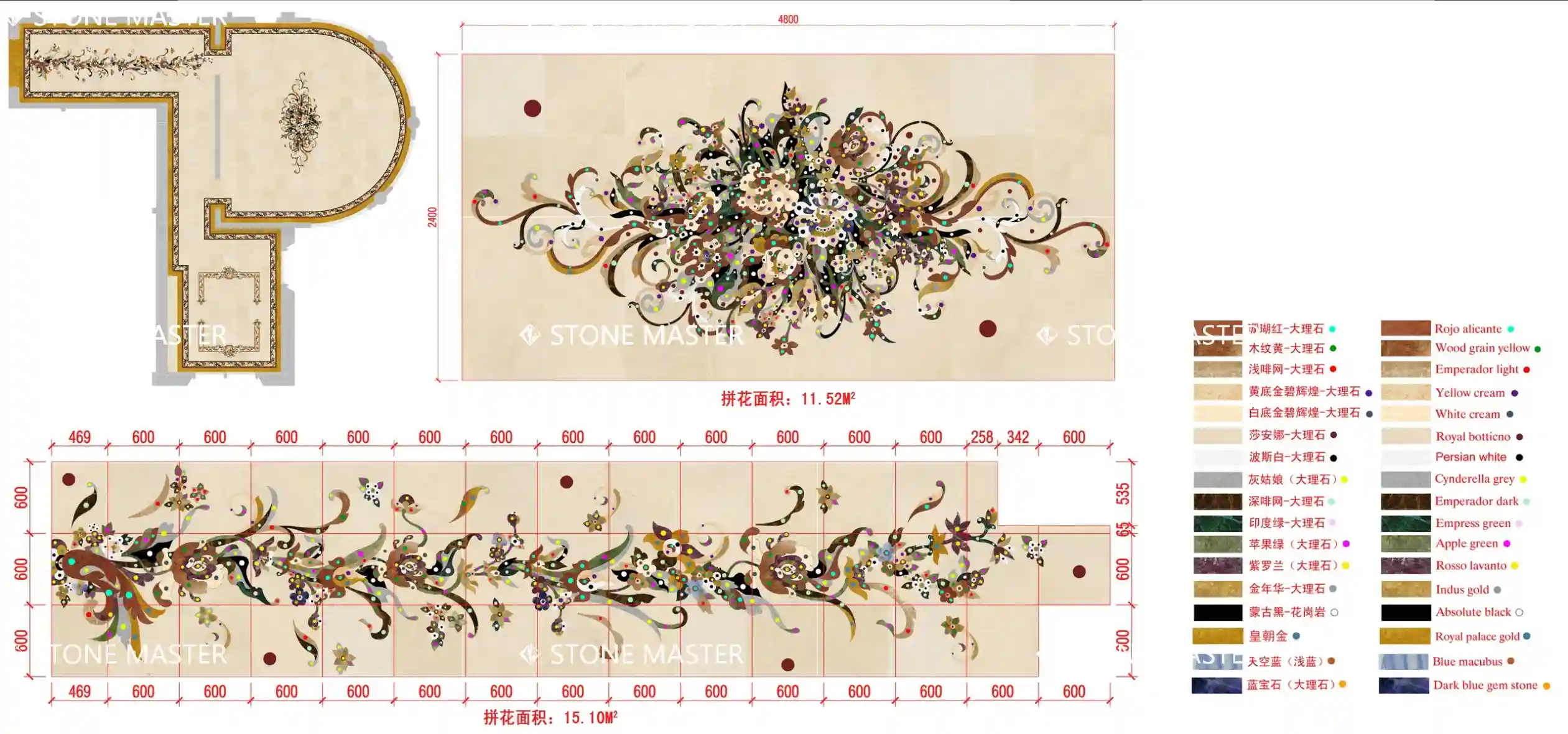
Solid marble flooring and marble inlay flooring offer different experiences in both appearance and purpose.
Solid marble floors are uniform and elegant, often chosen for their clean, minimalist aesthetic.
Marble inlay floors, in contrast, are designed to stand out—with colorful, detailed artwork embedded directly into the stone.
Where solid marble reflects simplicity, marble inlay celebrates complexity and craftsmanship.
An inlay marble floor is ideal for statement areas like foyers, hallways, or formal rooms where impact matters.
It allows for personalization and storytelling, while still retaining the timeless beauty of natural stone.
Both types are luxurious, but inlay work in marble transforms a floor into a focal point of design.
If you want to turn your flooring into a conversation piece, marble floor inlay is the way to go.
Marble inlay flooring begins with a precise cutting process, where shapes are carved from stone based on detailed designs.
Historically, artisans used hand chisels and saws to shape each piece, requiring great skill and patience.
Today, many professionals use advanced CNC waterjet machines for cleaner, faster cuts with ultra-fine precision. Stone Master uses the most advanced fix-axis waterjet cutting machine to ensure the cutting edge of each marble parts is perfect.
Waterjet technology enables more complex patterns and reduces waste, while still honoring the integrity of traditional methods.
Inlay marble designs can include sharp geometric motifs or delicate floral curves, both achievable through modern equipment.
While the tools have evolved, the heart of marble inlay work remains the same: care, precision, and artistic vision.
Whether hand-cut or machine-cut, each inlay element is shaped to fit perfectly with its neighbors, like stone marquetry.
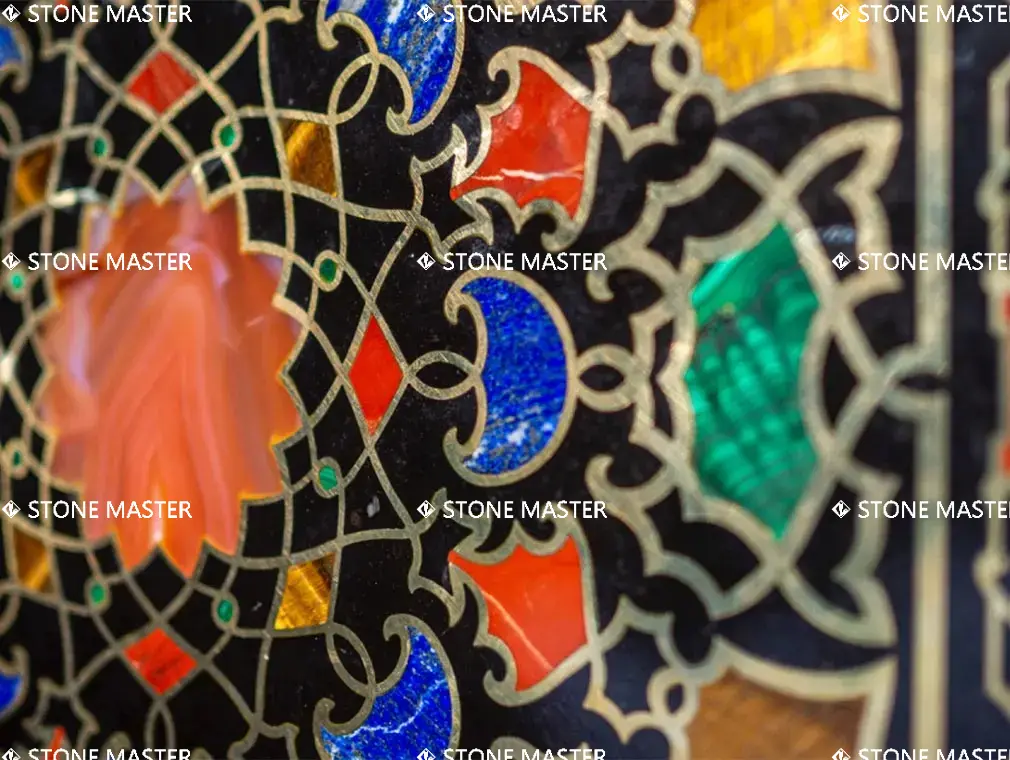
Once each piece is cut, the marble inlay floor comes to life through careful assembly.
Artisans lay the cut pieces face down on a pre-drawn pattern, assembling the design like a complex puzzle.
Each stone is glued into a carved recess in the marble slab, aligning perfectly with the overall layout.
Once all pieces are set, the surface is flipped and polished until smooth, revealing a single, monolithic pattern.
The process requires precision and timing—if one piece is out of place, the entire marble inlay work can be compromised.
After polishing, the inlay floor is sealed to enhance its shine and protect it from moisture and wear.
This meticulous process transforms loose fragments of stone into unified, elegant marble inlay flooring.
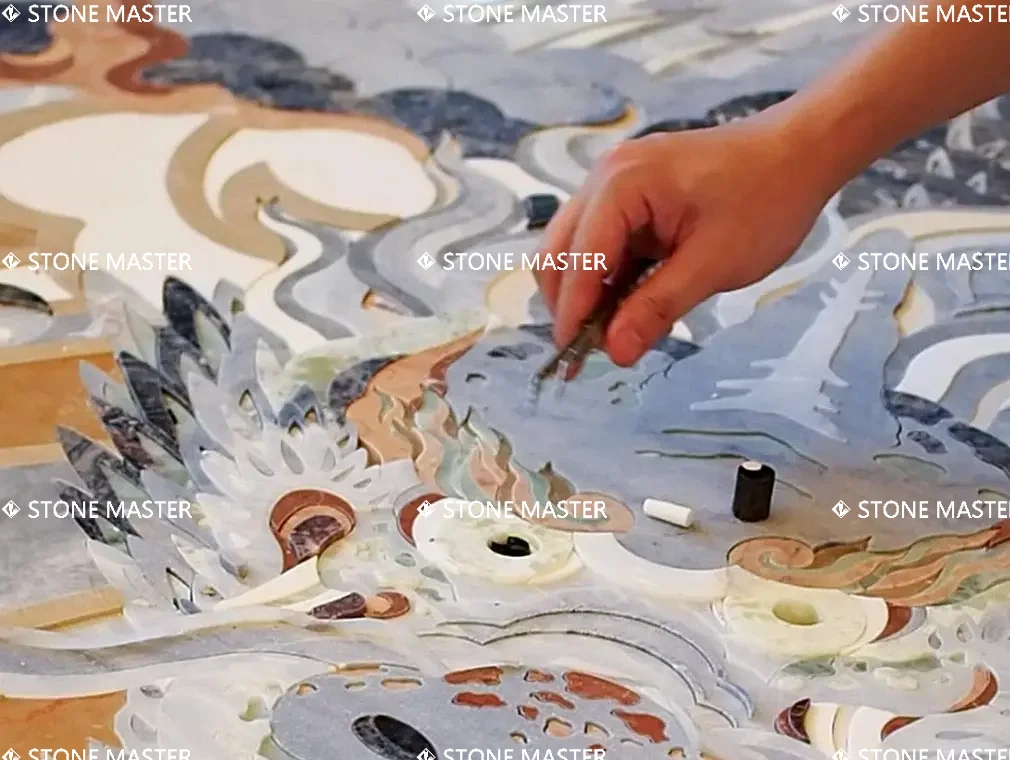
Despite modern machines, the human hand remains central to inlay marble craftsmanship.
Designers visualize the composition, choose matching materials, and ensure that color tones and grain flow beautifully.
Master artisans refine every edge, align every piece, and polish the result to flawless perfection.
Their eye for detail and understanding of stone characteristics ensure a seamless blend of beauty and durability.
True marble inlay work reflects not just technique, but experience passed down through generations.
Inlay marble is more than a floor—it is a legacy carved in stone.
At Stone Master, marble inlay isn’t just a technique—it’s a family tradition.
Our craftsmanship spans over two generations, combining classic hand skills with modern precision tools.
Each marble inlay floor is a result of thousands of hours of refined practice and attention to detail.
From noble villas to international landmarks, our marble inlay work represents timeless design and flawless execution.
We don’t just build flooring—we create living art that reflects our legacy.
When you choose Stone Master, you’re choosing heritage, skill, and beauty embedded in every inlay marble piece.
The origins of marble inlay can be traced back to the art of Pietra Dura, which flourished during the 16th century.
This intricate craft was first developed in Florence, Italy, as a luxurious form of stone decoration used in furniture and architecture.
Simultaneously, the Mughal Empire in India embraced similar techniques, bringing new life to inlay marble artistry.
In both regions, artisans began using small, precisely cut pieces of semi-precious stones, embedding them into marble slabs.
This form of inlay marble work became a hallmark of wealth, royalty, and refined taste.
It combined the beauty of natural stone with the precision of master craftsmanship to create timeless floor and wall art.
What began as an elite decorative technique soon evolved into an architectural movement that would influence centuries of design.
Today’s marble inlay flooring is rooted in this tradition, offering both historical richness and modern elegance.
Image from Wikipedia Pietra Dura Gallery:
Pietra Dura wasn’t just a decorative technique—it revolutionized the use of stone in architecture and interiors.
Unlike simple surface treatments, this method involved artistic storytelling through colorful stone inlays set into marble.
In royal courts and sacred buildings, marble inlay work symbolized wealth, culture, and eternal beauty.
Its influence extended far beyond Italy and India, inspiring new architectural expressions across Europe and Asia.
The durability of inlay marble floors made them ideal for long-lasting visual impact in high-traffic, prestigious spaces.
Pietra Dura techniques also raised the bar for craftsmanship, with standards so high they remain unmatched even today.
This legacy lives on in every modern marble inlay flooring project—blending function, durability, and artistry.
To understand marble inlay’s appeal today, you must first appreciate the historical revolution Pietra Dura sparked.
Throughout history, some of the world’s most famous architectural landmarks have featured exquisite marble floor inlay.
These buildings not only highlight the artistic depth of marble inlay flooring but also preserve its cultural significance.
Here are five timeless examples of inlay marble work that continue to inspire modern design:
Built in the 17th century, the Taj Mahal is one of the world’s most famous examples of marble inlay work.
Its walls and floors are covered with delicate floral and geometric designs created from semi-precious stones inlaid in white marble.
The scale, detail, and beauty of this monument showcase how marble inlay can turn architecture into eternal art.
Originally designed as a ceremonial entrance to Buckingham Palace, the Marble Arch in London features fine inlay marble elements.
Though modest compared to Eastern works, its structure reflects Western admiration for classical marble inlay flooring.
It remains a lasting symbol of neoclassical architecture and design refinement.
The Royal Palace in Amsterdam showcases grand marble inlay floors in its central halls.
Inspired by celestial maps and navigation symbols, its designs are both decorative and educational.
This palace is a beautiful example of European marble inlay flooring with functional storytelling.
The Pantheon features geometric marble inlay flooring that reflects Roman perfection in architecture and math.
Its patterned stone floors use concentric shapes and colors to guide visual flow.
A true celebration of symmetry, its inlay marble design still inspires architects around the world.
The Palace of Versailles represents the peak of marble inlay flooring in European design.
Hallways and ballrooms are lined with intricate floor inlays that radiate French luxury.
These masterpieces show how marble inlay work was used to showcase royal power and elegance.
In today’s luxury design market, marble inlay flooring is a top choice for homeowners who want elegance and individuality.
From grand entryways to bathrooms and dining rooms, inlay marble floors create a personalized statement in every space.
These floors serve not just as a surface, but as visual art that enhances the entire interior.
Architects and interior designers use marble inlay flooring to add timeless charm and cultural depth to residential spaces.
Some popular applications in luxury homes include:
Unlike standard tiles or hardwood, marble inlay floors elevate the interior with handcrafted beauty.
As design trends shift toward personalization and natural materials, inlay work in marble continues to rise in demand.
Choosing marble inlay flooring instantly gives a home a high-end, custom look rooted in tradition and fine artistry.
While marble inlay is popular worldwide, certain regions have embraced it as a deep cultural tradition.
In India, marble inlay work is part of architectural heritage, seen in temples, palaces, and modern villas alike.
The Middle East, particularly countries like the UAE and Saudi Arabia, use marble inlay flooring in mosques, hotels, and mansions.
Eastern European countries, such as Russia and Ukraine, also feature inlay marble in their neoclassical architecture.
Each region uses marble inlay differently, reflecting unique patterns, materials, and spiritual meaning.
Some distinct regional trends include:
This cultural variety keeps marble inlay flooring rich in design possibilities, making it a global favorite among luxury designers.
Whether in a Dubai penthouse or an Italian estate, inlay marble adds refinement that crosses borders.
Beyond its visual appeal, marble inlay flooring is valued as a long-term investment in both aesthetics and property value.
Natural stone is known for its durability, and when combined with fine inlay work, it becomes a lasting design element.
Marble floor inlay can endure for decades with proper care and occasional resealing, offering beauty that doesn’t fade.
Unlike mass-produced flooring, every marble inlay floor is handcrafted, unique, and timeless.
Reasons why homeowners and developers see marble inlay flooring as a luxury asset:
Inlay work in marble represents more than trend—it’s a symbol of craftsmanship and permanence.
For anyone seeking flooring that blends art, longevity, and luxury, marble inlay is a choice that pays off for life.
Marble inlay flooring is renowned for its exceptional aesthetic appeal and timeless elegance.
Unlike plain surfaces, inlay marble floors turn functional areas into works of art.
Every design is crafted to blend natural materials into visual harmony, offering a luxurious finish.
Whether you’re working with a traditional or modern space, marble inlay flooring adapts beautifully.
Some key visual advantages include:
Each marble inlay floor is unique, reflecting the homeowner’s personality and taste.
From floral and geometric to abstract and mosaic patterns, the creative options are limitless.
When you invest in marble inlay flooring, you’re not just choosing flooring—you’re choosing floor-level art.
Beyond beauty, marble inlay flooring is extremely durable, making it a wise long-term investment.
Crafted from strong natural stone and bonded with expert inlay work, these floors resist daily wear.
They are especially suitable for high-traffic areas in luxury homes and commercial buildings.
Durability highlights:
To maintain marble inlay flooring’s original finish, periodic resealing is recommended—typically once or twice a year.
This helps retain the surface gloss and protects inlay marble work from discoloration.
With minimal effort, these floors can look stunning for decades.
One of the greatest strengths of marble inlay is its design flexibility.
You can choose from countless marble inlay patterns or create something entirely original.
From subtle accents to bold centerpiece medallions, every detail can be tailored to your vision.
Customization options include:
Working with skilled artisans allows you to transform ideas into inlay marble masterpieces.
Whether you’re designing for a villa, hotel lobby, or penthouse, the marble inlay floor becomes an expression of luxury and identity.
Despite its ornate appearance, marble inlay flooring is low maintenance and easy to clean.
With regular care, it continues to look fresh and polished without constant effort.
Simple upkeep tips:
There’s no need for frequent waxing or polishing—just a microfiber cloth is enough to bring back the natural glow.
This effortless maintenance makes marble inlay flooring ideal for busy luxury lifestyles.
It delivers lasting beauty with minimal day-to-day care.
While marble inlay flooring delivers exceptional beauty and value, it does come with a higher upfront cost.
This is primarily due to the premium natural stone materials, the detailed inlay work, and the expert installation required.
Every piece of inlay marble is cut, shaped, and placed with high precision—often by hand or via advanced waterjet machinery.
Key cost factors include:
For homeowners or developers seeking budget-friendly solutions, marble inlay may seem costly at first.
However, this one-time investment offers long-term value and timeless visual appeal, which cheaper materials cannot match.
If your goal is to create an unforgettable space, the cost of marble inlay flooring is often justified by its lasting impact.
Another consideration when choosing marble inlay flooring is its slippery nature when wet.
Polished stone surfaces, while elegant, can pose a slip hazard—especially in areas like bathrooms or kitchens.
This makes it important to take proper safety precautions during installation and daily use.
Here are a few simple ways to reduce slip risks:
These preventative measures allow you to maintain the luxurious look of marble inlay flooring while ensuring it’s safe for everyone in the household.
With thoughtful design and planning, the potential for slipperiness can be effectively managed.
Due to its natural porosity, marble inlay requires consistent maintenance to preserve its beauty and functionality.
Marble, limestone, and other stones used in inlay flooring can absorb liquids if not properly sealed.
This can lead to stains, etching, and even long-term water damage if neglected.
Best practices for upkeep include:
Marble inlay flooring is low-maintenance in daily care, but it demands long-term attention through scheduled sealing.
This protects not just the base marble but also the inlay marble work, ensuring your floors remain vibrant and structurally sound for decades.
Marble inlay flooring isn’t just for palaces or museums—it’s a versatile, high-impact design choice for today’s luxury spaces.
Whether you’re designing a private residence, a luxury retail store, or a formal public space, the strategic use of marble inlay can immediately elevate the atmosphere.
Marble inlay is ideal for high-end homes and villas where every detail matters.
Most popular areas include:
These applications transform everyday spaces into timeless expressions of taste and craftsmanship.

Marble inlay flooring also enhances upscale commercial or hospitality environments.
Common uses include:
The intricate details of inlay marble flooring help define zones of importance and impress visitors with lasting elegance.
By placing marble inlay in focal areas, you make the most of its artistry without overwhelming the space or your budget.
Targeted use creates high-impact visuals while maintaining a refined aesthetic.
Whether you’re after classic charm or modern luxury, the right placement makes all the difference.
Choosing the right marble inlay design is the key to making your floor not only beautiful but meaningful.
With so many styles, materials, and color combinations available, it’s important to select a marble inlay that fits your space, lifestyle, and aesthetic goals.
Start by identifying where the marble inlay flooring will be installed and what purpose the space serves.
Understanding function helps match the tone—grand, serene, or dynamic.
Your marble inlay design should reflect the overall architecture of your property.
Always consider the visual language of the entire home or building.
Marble inlay offers incredible customization options—but thoughtful choices make it successful.
You can also work with Stone Master professional designers to create a custom marble inlay floor that feels like part of the architecture, not an afterthought.
When it comes to premium marble inlay flooring, choosing the right partner makes all the difference.
Stone Master is a globally trusted name in custom marble inlay work, combining expert craftsmanship with decades of heritage and advanced technology.
From concept to creation, we deliver unmatched quality and tailored solutions for luxury spaces.
With over 25 years of experience in marble inlay, Stone Master is built on a legacy of excellence.
Our artisans are masters of pietra dura techniques—many of them second-generation craftsmen who’ve refined their skills over decades.
Every marble inlay floor is a result of passion, precision, and artistic vision passed down through time.
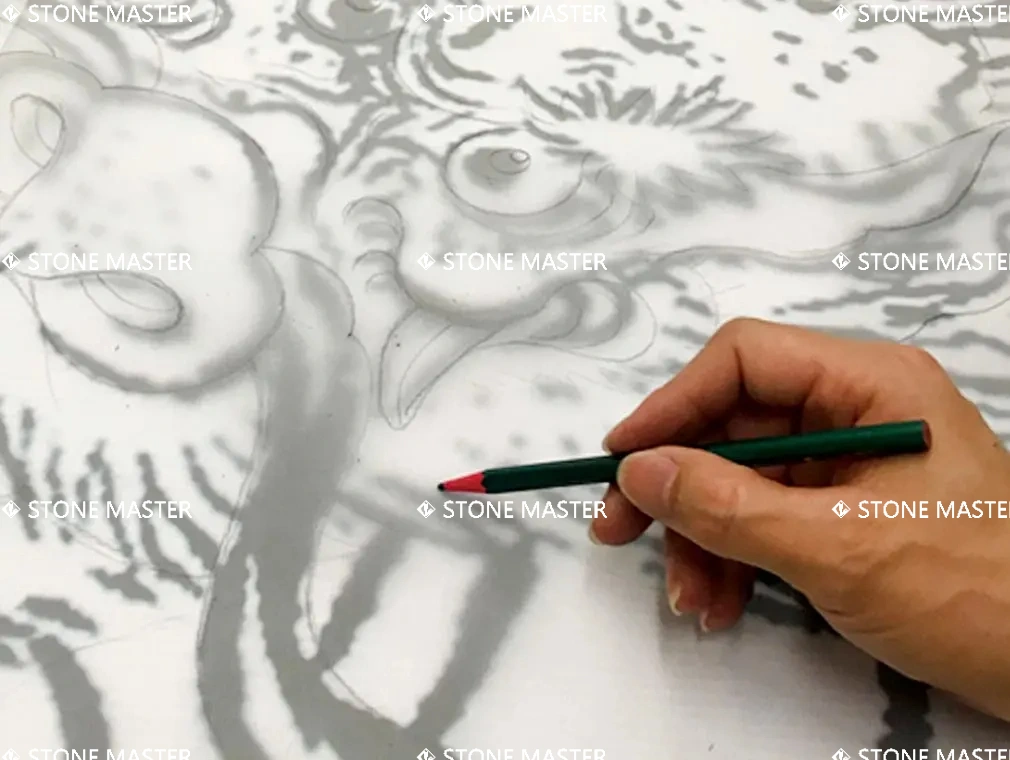
We don’t believe in one-size-fits-all.
Whether you want classical floral medallions or bold geometric patterns, our team works closely with you to bring your ideas to life.
Our design services include:
At Stone Master, we combine the artistry of hand-inlay with modern innovations like waterjet cutting.
This ensures precision, consistency, and faster lead times without compromising artistic integrity.
Our quality control process ensures every marble inlay floor we produce is flawless.
We’ve completed thousands of successful marble inlay flooring projects in villas, hotels, showrooms, and mosques worldwide.
No matter your location, our logistics and technical teams support your project from design to installation.
With Stone Master, you’re not just buying marble inlay—you’re investing in lasting elegance and artistic mastery.
Marble inlay flooring is more than just a decorative choice—it’s an investment in timeless beauty, skilled craftsmanship, and lasting value.
From its intricate artistry to its custom design flexibility, marble inlay transforms ordinary floors into extraordinary works of art.
Whether you’re building a luxury villa, redesigning a grand entrance, or creating a serene spa, marble inlay delivers elegance that endures.
While it may require thoughtful planning and regular care, the results are unparalleled.
And with the right partner, the journey to your dream floor is seamless.
At Stone Master, we bring your vision to life with custom marble inlay flooring tailored to your space, style, and story.
Our team of expert designers and artisans will guide you every step of the way—from design consultation to final delivery.
🌟 Request a Free Quote
🌍 Explore Our Global Projects
📩 Contact Us Today to Start Your Custom Design
Let’s create a floor that speaks your language—crafted in stone, built to last.